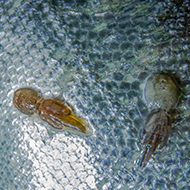
Researchers aim to pinpoint key genes associated with resistance.
Researchers at the University of Edinburgh’s Roslin Institute have launched a study to identify genes that could make Atlantic salmon resistant to sea lice.
Sea lice are parasites that severely affect fish health and welfare and cost the worldwide aquaculture industry around £800 million each year.
In this new study, researchers aim to pinpoint key genes and associated biological processes underlying genetic resistance to these parasites.
The scientists will examine the response to lice attachment exhibited by coho salmon, a species of salmon which is fully resistant to sea lice, and then apply this knowledge to Atlantic salmon, which is susceptible.
To do this, they will use data previously collected from 12,000 infected fish to identify regions of the salmon genome associated with resistance to sea lice. They will also compare Atlantic salmon with coho salmon to study the essential mechanisms, genes and proteins involved in their different responses to lice.
Through studies assessing the effects of silencing genes of interest, scientists will use gene editing to validate and select genes and processes that may be related to resistance.
The research will initially be conducted in fish cells to identify the genes most likely involved in lice resistance. The team will then target these genes to produce gene-edited salmon embryos.
Professor Ross Houston, personal chair of aquaculture genetics at the Roslin Institute, explained: “Gene editing has potential to expedite the breeding of disease-resistant salmon by making targeted changes, informed by years of research into the genetic and functional mechanisms of resistance to sea lice.
“Work by our consortium aims to improve fish health and welfare, and enhance the sustainability of the salmon aquaculture sector, which is worth approximately £1 billion per year to the UK economy and is a major source of employment in rural communities of the Scottish Highlands.”
The project is being conducted in collaboration with the University of Stirling’s Institute of Aquaculture, with £1.7 million of funding from the Biotechnology and Biological Sciences Research Council and the Sustainable Aquaculture Innovation Centre.
James Bron, a professor of aquatic animal health at the University of Stirling, commented: “The University of Stirling’s Institute of Aquaculture brings more than 30 years’ research into the interactions of sea lice and Atlantic salmon to this collaboration.
"Advances made in disease control for Atlantic salmon aquaculture are relevant to the culture of other key species, so developing and applying these cutting-edge technologies helps to increase aquaculture sustainability and global food security.”



 The veterinary mental health charity Vetlife is inviting the veterinary community to join it for a sponsored cold-water dip.
The veterinary mental health charity Vetlife is inviting the veterinary community to join it for a sponsored cold-water dip.